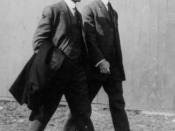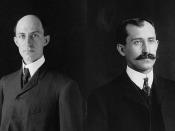A quest is "an act or an instance of seeking or pursuing something", or it can simply just be a search for something. During medieval times, a quest was described as "an expedition of a knight in order to perform a prescribed feat" (Dictionary.com). Originally, the word quest was derived from a Latin word that meant "to seek" (Classics). A quest can be either literal one or a symbolic one. Gilgamesh, a Mesopotamian hero, had made a journey to find the secret of everlasting life. This was a literal quest. On the other hand, examples of symbolic quests are examined in any medieval stories of the Holy Grail, where the search was to discover religious truths and values. There are three things in general that a quest is looking for""inner peace, virtue, or experience. For human beings, it is very important to have an ideal quest. That is because one's personal quest eventually becomes a force that drives and determines what one will do in the future.
One may never actually find what he searches for, but his ideal quest will definitely influence his behavior and decisions. My ideal quest is to some day figure out why and for what purpose I was born and given life.
In general, there are three kinds of quests. The quest for inner peace is the pursuit for the peace of mind. For instance, Odysseus' quest was to return home to his wife, Penelope, in the Odyssey. Furthermore, another type of quest is the quest for virtue. The quest for virtue is the search for moral excellence or for "a particularity good or beneficial quality" (Dictionary.com). For example, in Inferno, Dante was on a quest to view and sense what Hell was like. The quest for experience is usually a search for the self "in relationship to the rest of the world""natural, human, and artificial" (Dictionary.com). An example is the poem "Ithaka," about Odysseus' journey back home. The poem explains that the "joy [of the quest] is in the voyage, not in the arriving" (Classics).
In life, I theorize that every single person on the face of the earth was given life for a special mission to accomplish on earth. The ideal quest of every person is to accomplish it, and every person is fated to accomplish that mission. Some people have a very significant mission that effects everybody else. Other people's missions are not significant in a way as to influence the whole world, but their missions are as significant to the few people, maybe even only one person, that they influenced. For example, I find it the Wright Brothers' mission in life to contribute the technology of an airplane to the rest of the world. Furthermore, my great grandfather's mission in life was to build the foundation and cornerstone of the Sarkar family's pearl business and to bring the Sarkar family off the streets and into nice houses. The Wright Brothers are remembered by the whole world and are known as scientific heroes. My great grandfather may only be remembered by the Sarkar family, but he is more significant to the Sarkar family than the Wright Brothers are.
My ideal quest is to understand my motive for being alive. In other words, the question that bounces around in my head is "Why am I alive?" I want to find out the reason behind my creation. I want to some day be able to look back at my life and realize that why I had lived my whole life. Other people might think that not every person lives to a purpose, but my belief is just the contrary. At this moment, I do not clearly know what my mission exactly is, but I do know that every step I take right now will eventually lead to my mission's success. My clues so far tell me that my mission will be about some break through in the computer world. The break through may be one that the whole world takes to account, or it may just be a simple virus that I might fix in someone's computer, saving that person's most important files from destruction. I don't know what my mission exactly is, but I hope that while trying to accomplish it, I will face a few problems. That is because solving and overcoming the problems will make me a stronger person and will cause me to be more determined to accomplish my mission.
My ideal quest is a combination of two types of quests because it fits the definition of both of them. My ideal quest is one of inner peace because I will not be able to die before I figure out what I was given life to do. Death will only come to me after my mission in life is accomplished. In addition, my ideal quest is of experience because I have to live my whole life to achieve the goal for which I am living. Until the goal is accomplished, I must work and build up to the point where I can complete my mission.
The word quest means "an act or an instance of seeking or pursuing something" (Dictionary.com). Medieval times described quests as expeditions "of a knight in order to perform a prescribed feat" (Dictionary.com). There are literal quests or symbolic quests. Gilgamesh's quest, a literal quest, was find the secrets of everlasting life. Medieval stories of the Holy Grail were symbolic quests in search for religious truths and values. Generally, quests are pursued for inner peace, virtue, or experience. Having an ideal quest is essential because one's personal quest has many effects on the type of person one becomes. My ideal quest is to find out what I was given life to do and accomplish my given mission in life.





